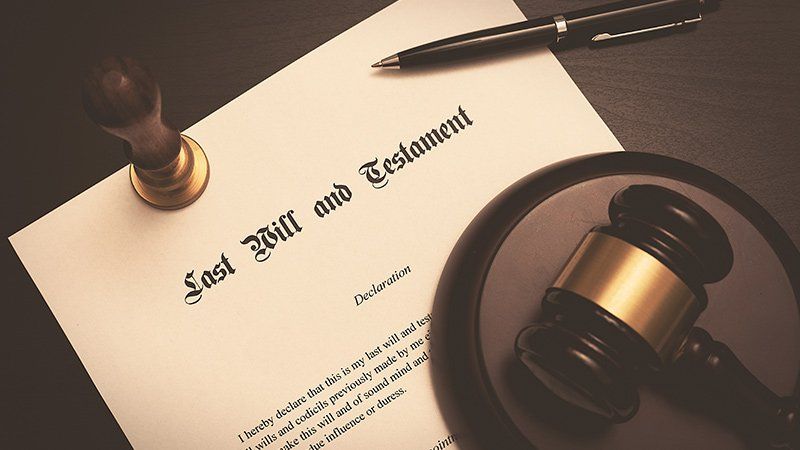Wills – Trusts – Estates
General Overview
Wills, trusts, and estates all involve the planning and execution of the transfer and management of assets of a person who has passed away to the remaining family and other beneficiaries of that deceased person.
What Is A Will
A will is a written document executed by a person who sets out that person’s directions on what is to be done with his or her assets after their death. In order for the instructions contained in a will to be carried out, a probate case must be filed in district court and legal proceedings are carried out under the authority of the court to complete the distribution of the assets.
What Is A Trust
A trust is a written document executed by a person which creates a trust, which is similar to creating a corporation or another legal entity which has its own legal existence. Then, after the trust is created, the person’s assets are transferred to the trust which then owns the them. Upon death, the instructions of the trust dictate what is done with the deceased person’s assets. A trust does not require any filing of a case and courts do not get involved in the estate. It is administered by the private trustees of the trust who were appointed or designated by the person creating the trust.
What Is Estate Planning
Estate Planning refers to the process of determining what mechanisms to use to give effect to a person’s plan for the division and administration of his or her estate upon death. It may involve the use of wills, trusts or other dispositional processes such as joint tenancy deeds, transfer on death deeds or contractual provisions of pay on death beneficiaries and designation of beneficiaries under accounts and insurance policies.
Each individual and family is unique. As such, the team at Ritchie, Rock & Atwood believes it is vital to take time at the beginning with each client to understand their concerns, goals, and wishes.
The Advantage Of A Well-Drafted Will
Wills are the foundational and traditional way estate planning is done in preparation for one's death. The typical well-done will is drafted by an attorney working with the client in order to tailor it to accomplish the client's desires for the distribution and treatment of their property upon death. Wills are drafted so that they are “self-proving” so that they can be admitted to probate without the necessity of witnesses appearing to prove that it represents the deceased person’s desires.
Wills can also be informally done as holographic wills. A holographic will is one which the person drafts completely in their own handwriting, is dated by them, and signed by them. Holographic wills are highly discouraged in that they are often open for litigation. A person that is not very knowledgeable about the laws of estates can make many mistakes in trying create their own will, which may well result in expensive litigation that could result in the entire will being determined to be invalid by a court.
Some Trusts Can Change With Your Circumstances
A common form of trust is a “Revocable Living Trust,” which is quite versatile. With this type of trust, the person creates a trust which they can change, or even terminate, at a time of their own choosing during their lifetime. These trusts do not change a person's relationship to their property while they are living. Even though a trust has been created and placed their property in that trust, they continue to operate as usual with full access to, and authority over, their property. However, upon death, their assets are disposed of according to their private instructions to their successor trustees without the need of any court case being filed.
Another form of trust is an “Irrevocable Trust”. With this kind of trust, a person creates the trust and transfers assets to the trust for the benefit of designated beneficiaries. Generally speaking, once created they are permanent and can’t be changed. These type of trusts also avoid probate with the estate being administered according to private instructions given to the trustees of the trust.
What Happens If Nothing Has Been Prepared
When a person passes away and that person does not have a will or trust, or another mechanism set up to pass their property to their family or intended beneficiaries, it is referred to as a person passing away intestate. In such cases, the law of intestate succession dictates how their property is to be distributed to their heirs. In order to accomplish this, a case must be filed in the district court to administer the estate and the court determines to whom the property goes under the laws of intestate succession.
Property such as real estate, cars, boats, bank accounts, etc. that are titled assets present issues that must be resolved through a proceeding in district court in order to pass legal title to the heirs of the deceased person.
Understanding Your Options Is Key To Estate Planning
There are many approaches and mechanisms to use in estate planning. What is stated in the previous sections is not even scratching the surface. If you are interested in planning your estate, or if you are going through the loss of a loved one and attempting to deal with the remaining estate, the attorneys at Ritchie, Rock & Atwood Law Firm are available to answer your questions.
SHARE THIS INFORMATION
Our Law Firm’s Primary Locations For Wills – Trusts – Estates
- Oklahoma City, Oklahoma
- Tulsa, Oklahoma
- Pryor, Oklahoma
- Claremore, Oklahoma
- Jay, Oklahoma
- Shawnee, Oklahoma
- Oklahoma County, Oklahoma
- Tulsa County, Oklahoma
- Rogers County, Oklahoma
- Wagoner County, Oklahoma
- Mayes County, Oklahoma
- Delaware County, Oklahoma
- Pottawatomie County, Oklahoma





